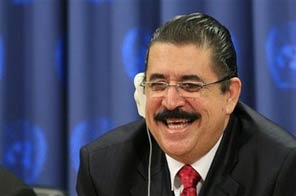Zelaya meets Clinton
TEGUCIGALPA: Ousted Honduran leader Manuel Zelaya met with US Secretary of State Hillary Clinton in Washington Tuesday, as the leaders who sent him away hinted at a possible exit in the crisis.
Zelaya -- who the army prevented from landing in the capital Tegucigalpa during violent protests Sunday -- could come back if Congress grants him amnesty, a spokesman for the Supreme Court told AFP.
"The only one with the power to give amnesty is the Congress," said Danilo Izaguirre, spokesman for Honduras' Supreme Court.
Zelaya's highest-level meeting with the US administration so far in the crisis came Tuesday amid increasing pressure on the leaders who packed him away on June 28 over a dispute with the courts, politicians and the army over his plans to change the constitution.
"We are open to dialogue. We want to be heard," interim leader Roberto Micheletti said Tuesday, amid world-wide condemnation for the coup, as well as violence on the streets.
A spokesman for the UN High Commissioner for Human Rights on Tuesday condemned "excessive force" by authorities quelling protests in Honduras, after two deaths in weekend clashes with the army.
A commission from the interim government also was in Washington as Zelaya met with Clinton.
Roberto Micheletti, who interim leaders insisted took power in a "constitutional succession," not a coup, said that Costa Rican President Oscar Arias, a Nobel Peace Prize winner, had agreed to mediate the crisis.
Meanwhile, pro-Zelaya protests sprang up Tuesday for the ninth consecutive day, with thousands on the streets of the capital Tegucigalpa.
"We're going to continue with peaceful resistance, despite the repression," union leader Juan Barahona told AFP.
UN chief Ban Ki-moon said Monday that the Organization of American States should work to restore constitutional order, after the 34-member pan-American body suspended Honduras at an emergency session over the weekend.
The Honduran crisis is the biggest challenge yet for US President Barack Obama's Latin America policy, in a region where the United States holds great influence.
"I will return to Honduras, there's no doubt about that," Zelaya said in Nicaragua late Monday.
International pressure on the Central American nation includes a freeze on aid, the recalling of ambassadors and temporary trade embargoes.
Venezuelan President Hugo Chavez, Zelaya's key backer, said he has suspended crucial shipments of oil.
The Pentagon has suspended all military activities with Tegucigalpa until further notice.
The coup leaders say they are prepared for an economic blockade of at least six months, in order to hold out until scheduled elections in November, but analysts warned that they would struggle to resist economic sanctions.
Zelaya faces arrest for 18 alleged criminal acts, including corruption and failing to implement scores of laws approved by Congress.
It was unclear exactly how many people had been injured and detained in the past week's clashes, amid growing indignation from international rights groups.
Night curfews -- which suspend some freedoms guaranteed by the constitution -- and media blackouts have heightened tension in one of Latin America's poorest countries.
The challenges for negotiators in the crisis include an increasingly polarized nation, but many Hondurans, both rich and poor, said they just wanted peace, and for that, Zelaya needs to stay away.
Taxi driver Jose Rodriguez said that both sides make him angrier by the day.
"I don't want Zelaya to return, but I don't like what the crowd around Micheletti is doing either," Rodriguez said.
"Most Hondurans just want to work and to get back to normality again."






